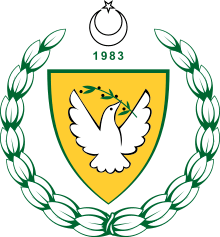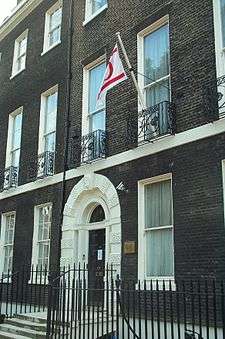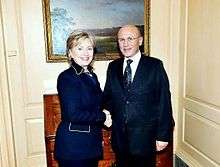Foreign relations of Northern Cyprus
 |
|---|
| This article is part of a series on the politics and government of Northern Cyprus |
Northern Cyprus is recognised only by Turkey, a country which facilitates many of its contacts with the international community. After declaring independence from the Republic of Cyprus, Northern Cyprus' relations with the rest of the world were further complicated by a series of United Nations resolutions which declared its independence legally invalid. A 2004 UN Referendum on settling the Cyprus dispute was accepted by the Turkish Cypriots but rejected by the Greek Cypriots. After that, the European Union declared its intentions to assist in reducing the economic isolation of Northern Cyprus and began giving aid to the territory. However, due to pressure from Greece and the Republic of Cyprus, this aid coming from EU funds cannot be used on Greek Cypriot land and property nor on public bodies. As a result, these funds can be used only on around 20 percent of the territory under the de facto control of Northern Cyprus.[1]
There is an embargo against the entity in many areas, decisively affecting its attempts at international contacts and representation.
International recognition
Turkey is the only country which recognises Northern Cyprus and has an embassy in North Nicosia. Northern Cyprus has an embassy in Ankara.
In 2005, Yahya Jammeh, then President of Gambia, said that his country was ready to recognise the independence of Northern Cyprus. The Cypriot government protested and Gambia did not recognise the TRNC.[2]
Azerbaijan and Gambia expressed their willingness to eventually formally recognise the TRNC. They so far have not followed through, but their informal contacts have increased. Also, diplomats from other countries have recently officially visited the TRNC Embassy in Ankara to hold meetings with the TRNC Ambassador. The latest nation to state their intention to (positively) change its policy towards TRNC is Paraguay.
Recognition withdrawn
In 1983 Bangladesh and Pakistan withdrew recognition after UNSC Resolution 541 and international pressure.[3][4]
Diplomatic representations
At the present time, only Turkey maintains a formal embassy in the TRNC, while the TRNC has an embassy and consulates in Turkey. In various other countries, the TRNC has unofficial representative offices. Turkey represents the TRNC's interests in countries without such offices. In North Nicosia (the Turkish Cypriot administered northern half), both the British High Commissioner to Cyprus and the United States Ambassador to Cyprus have their formal residences, though since these residences had been in use since before 1963, it is not indicative of formal recognition of the TRNC by the United Kingdom or United States. In the same situation are the representative offices maintained by Australia, France, Germany, South Korea.
In May 2015, the EU Infopoint office that aims to bring the Turkish Cypriots closer to the EU, has been inaugurated in North Nicosia.[5]
Honorary Representatives are also appointed by the TRNC in various other cities to represent the TRNC and to assist the primary TRNC Representative Offices.
United States, United Kingdom and Australia have representation offices in Northern Nicosia. As well, Northern Cyprus has a number of representations in other countries with various status.
Foreign Minister
The current Foreign Minister since 2018 is Kudret Özersay.
Bilateral relations
Azerbaijan
The Nakhichivan Autonomous Republic (an exclave of Azerbaijan) had issued a resolution in the mid-1990s recognising the TRNC’s independence, but Azerbaijan itself has yet refrained to officially support this decision due to the Nagorno-Karabakh issue, and recognises the Republic of Cyprus. Azerbaijan is sympathetic to the TRNC, but the Republic of Cyprus would recognise Nagorno-Karabakh if Azerbaijan officially recognised the TRNC.[6]
Cyprus
There are seven border crossings between Northern Cyprus and the Republic of Cyprus.[7] Since May 2004 some tourists have taken to flying to the Republic of Cyprus directly then crossing the green line to vacation in Northern Cyprus.[8] Two more border crossings (Lefka/Aplic and Derynia) were decided to be opened by Turkish and Greek Cypriot authorities.
The internationally recognised government of the Republic of Cyprus refuses to give any official status to the government of the TRNC, and actively dissuades any other country from doing so. This policy is in line with the United Nations Security Council resolutions and the policy of the entire international community which refuses to recognise the TRNC. The government of the Republic of Cyprus regards the TRNC in such terms as "illegitimate entity", "Turkish military occupied territory" and "a puppet state of Turkey". Phraseology such as "pseudo" or "so-called" are used by the Cyprus Government to describe government officials and institutions in the TRNC.
The TRNC President is referred to simply as the "Turkish Cypriot Leader" by the Cyprus Government, the EU and the United Nations. It is however interesting to note that under the 1960 Constitution of Cyprus, the Leader of the Turkish Cypriots is regarded as the Vice-President of the Republic of Cyprus with wide veto powers, but this status has not been acknowledged by the government of the Republic of Cyprus since December 1963. Due to this stance, the TRNC refuses any official recognition of the government of the Republic of Cyprus, calling it the "Greek Cypriot Administration of Southern Cyprus", and referring to its President as the "Greek Cypriot Leader". Turkey backs this position.
After the Republic of Cyprus became a member of the European Union, the southern part of the island became part of the Customs Union of EU. The Northern part of the island is excluded from the Customs Union. In spite of that, the Green Line regulations are intended to ease trade relations between North Cyprus and EU.
Oil exploration in East Mediterranean became a problem between the administrations of the north and the south side since 2000. The EU member Greece supports the south whereas EU-candidate Turkey supports the north.
Equatorial Guinea
In 2011 and 2012, president of Northern Cyprus Dervis Eroglu and president of Equatorial Guinea Teodoro Obiang Nguema Mbasogo held a meeting in New York, US.[9][10]
Greece
In 2014, the-then Turkish Cypriot negotiator Kudret Ozersay and his delegation was received by the Secretary General of the Greek Foreign Ministry, Anastasios Mitsialis.[11][12]
Guinea
In 2008, the minister of Economy, Finance and Planning of Guinea, Ousmane Dore, visited Northern Cyprus and met with Turgay Avci, the minister of Foreign Affairs of Northern Cyprus.[13][14]
Kosovo
On 18 February 2008, the President of the TRNC congratulated the people of Kosovo on their new-found independence, in direct opposition to the Republic of Cyprus, which rejects Kosovo's declaration of independence,[15] but not Turkey, which was the fifth country to recognise Kosovo.[16] However, presidential spokesman Hasan Ercakica stated that the TRNC was not preparing to officially recognise Kosovo.[17] In contrast, the Republic of Cyprus has rejected Kosovo's declaration of independence and, given the ICJ ruling that Kosovo's declaration of independence was not illegal, stated that Kosovo and Northern Cyprus were not analogous situations.[18] Some analysts have argued that the independence of Kosovo could provide support for the recognition of Northern Cyprus.[19]
Kyrgyzstan
In 2008 Kyrgyzstan earthquake, Northern Cyprus helped Kyrgyzstan and granted tents, blankets, tons of food, construction materials (cement, covering slate, timber and bricks), power generators, wood stoves, and warm clothes.[20] In 2016, a common Turkish Cypriot–Kyrgyz business cooperation forum was held in Kyrgyzstan.[21]
Libya
On 30 October 2011, Libya and Northern Cyprus signed the Cooperation on Health Services Protocol. The protocol included to reserve 250 beds at the Near East University hospital in North Nicosia for the treatment of injured Libyans.[22][23][24]
Pakistan
In February 2017, the president of Northern Cyprus (Mustafa Akinci) was received by the president of Pakistan (Mamnoon Hussain).[25]
Russia
In February 2008, Vladimir V. Putin, the President of the Russian Federation, equated the Northern Cyprus situation with that resulting from a unilateral Kosovo declaration of independence, which Mr Putin opposes, in order to point of European countries double standards in their desire to recognise Kosovo region as an independent state.[26]
On 2 September 2008, the Russian Ambassador to Turkey announced that if Turkey recognised the Georgian breakaway regions of South Ossetia and Abkhazia, Russia would recognise the TRNC as an independent country.[27] Later, Russian Foreign Minister Sergei Lavrov rejected this variant.[28]
Turkey

The TRNC fully supports Turkey's bid to join the European Union. As part of this bid, Turkey recently signed a protocol extending its customs union to the new EU members, including the Republic of Cyprus, which Turkey does not recognise. Turkey made sure this was not tantamount to recognition with the inclusion of a declaration, stipulating their continued policy of non-recognition of what they describe as the "Greek Cypriot administration of Southern Cyprus" until a settlement is reached. This declaration is not accepted by the EU which did not accept this statement as forming part of the acquis and expects Turkey to fully abide to its obligations against the Republic of Cyprus. The TRNC views any move by the EU to force Turkish recognition of the Republic of Cyprus as an effort to cut them off from their base of support. Turkey has pledged not to abandon the TRNC.
On 21.09.2011, Turkey and Northern Cyprus signed the EEZ border agreement in New York.[29][30]
United Kingdom

On 3 February 2017, UK's High Court ruled that "There was no duty in UK law upon the Government to refrain from recognising Northern Cyprus. The United Nations itself works with Northern Cyprus law enforcement agencies and facilitates co-operation between the two parts of the island."[31] Turkish Cypriot governmental officials declared that Northern Cyprus must be ready to Brexit since EU acquis will not be binding on UK thereby UK and Northern Cyprus can trade just as pre-1994 ECtHR ruling.
United States
United States abstained in a vote in 1984 in the UN Security Council condemning "secessionist activities" on Cyprus.[32] Northern Cyprus Representative Office is located at 1667 K Street, Northwest in Washington, D.C. The Representative Office in New York City is the de facto mission of the TRNC to the United Nations Organisation (as well as a de facto Consulate-General).
Membership in international organisations
In 1994, Northern Cyprus became an observer member of the International Organization of Turkic Culture (Türksoy).[33]
In 2004, Northern Cyprus became an observer member of the Organisation of Islamic Cooperation under the title "Turkish Cypriot State".[34] In 2017, Northern Cyprus was represented with its official name "Turkish Republic of Northern Cyprus" for the first time at an OIC conference in Saudi Arabia.[35][36]
In 2004, the Turkish Cypriot community was awarded "observer status" in the Parliamentary Assembly of the Council of Europe (PACE), as part of the Cypriot delegation. Since then, the two Turkish Cypriot representatives of PACE are elected in the Assembly of Northern Cyprus.[37][38]
On 16 October 2012, Northern Cyprus became an observer member of the Economic Cooperation Organization under the title "Turkish Cypriot State".[39] In 2017, Northern Cyprus was represented with its official name "Turkish Republic of Northern Cyprus" for the first time at an ECO conference in Pakistan.[40][41]
In 2013, Northern Cyprus Red Crescent Society became an observer member of the International Federation of Red Cross and Red Crescent Societies.[42]
See also
References
- ↑ Nathalie Tocci, The Cyprus Stalemate: What next?
- ↑ Abdulkadir Varoglu/Mehmet Cakar/Nejat Basim: An unusual bi-national military cooperation: The Case of Turkish-Gambian relations, in: Joseph Soeters/Philippe Manigart (eds.): Military Cooperation in Multinational Peace Operations: Managing cultural diversity and crisis response, London/New York 2008, pp. 117-128 (here: p. 124).
- ↑ "Northern Cyprus's Twin Brother – Taiwan « Humanities II – World History". Archived from the original on 24 December 2014. Retrieved 20 February 2015.
- ↑ "Is Now the Time for a Cyprus Deal?". Commentary Magazine. Retrieved 20 February 2015.
- ↑ Cyprus-Mail
- ↑ "Europe, the US, Turkey and Azerbaijan recognise the "unrecognised" Turkish Republic of Northern Cyprus". Retrieved 20 February 2015.
- ↑ "Cyprus Border Crossings". Cyprus Travel Secrets. Retrieved 6 April 2012.
- ↑ Charlton, Gill (5 February 2005). "On the case: non-existent flight; Northern Cyprus; children in the Algarve; Cannes". The Daily Telegraph. London. Retrieved 22 August 2011.
- ↑ Kibris Postasi 21 Sep 2011 President Dervis Eroglu met with the president of Equatorial Guinea
- ↑ Kibris Time 25 Sep 2012 Archived 13 March 2017 at the Wayback Machine. Eroglu's New York meetings are continueing.
- ↑ Kibris Postasi 28.02.2014 Is the psychological wall down?
- ↑ Hellenic Resources Network 28.02.2014
- ↑ Hurriyet 2008 Dore, the minister of Economy of Guinea, is in Northern Cyprus to meet with Turgay Avci, the minister of Foreign Affairs.
- ↑ Turk Ajansi Kibris Archived 13 March 2017 at the Wayback Machine. The minister of Economy of Guinea is in Northern Cyprus.
- ↑ "Kosovo recognized by Northern Cyprus: "No people can be forced to live under the rule of another"". Tiraspol Times. 18 February 2008. Retrieved 20 February 2008.
- ↑ "Statement of H.E. Mr. Ali Babacan, Minister of Foreign Affairs of the Republic of Turkey, Regarding the Recognition of Kosovo by Turkey". Ministry of Foreign Affairs of the Republic of Turkey. 18 February 2008. Retrieved 8 May 2008.
- ↑ "Ercakica on the recognition of Kosovos independence". Anatolia News Agency. 19 February 2008. Retrieved 21 February 2008.
- ↑ Sarah Fenwick (8 December 2009). "No Right To Self-Determination for Minorities – Cyprus". cyprusnewsreport.com. Retrieved 23 March 2011.
- ↑ Fulya Özerkan (25 July 2010). "Verdict on Kosovo will not affect Turkey". Retrieved 23 March 2011.
- ↑ International Federation of Red Cross and Red Crescent Societies Disaster Relief Emergency Fund (DREF) Operation Update
- ↑ MFA, TRNC Cyprus Turkish – Kyrgyz Business Cooperation Forum
- ↑ "Libyan Health Minister and NEU Rector signed Protocol for the Injured People in Libya". Near East University, Turkish Republic of Northern Cyprus. 31 October 2011. Retrieved 31 October 2011.
- ↑ turizmhaberleri 03 November 2011 Health Services Agreement was signed between Northern Cyprus and Libya
- ↑ NTV 31 October 2011 Libya de facto recognised Northern Cyprus
- ↑ Kibris Postasi 28.02.2017 President Mustafa Akinci participated to the dinner of presidents in Islamabad
- ↑ webposter. "edc.tsu.ru - Daily Review of Russian Press Reports on Kosovo". Retrieved 20 February 2015.
- ↑ "Ambassador:Russia shall recognise the TRNC right after Turkey recognizes South Ossetia". Famagusta Gazette. 2 September 2008. Archived from the original on 10 July 2011.
- ↑ "Russia Rejects Trade-Off With Turkey On Recognition Of Abkhazia, South Ossetia, Northern Cyprus". 7 October 2009.
- ↑ Official Gazette 12 July 2012
- ↑ Official Gazette EEZ Border (Page 4)
- ↑ Telegraph 03.02.2017
- ↑ Oliver P. Richmond, Mediating in Cyprus: The Cypriot Communities and the United Nations, Routledge, 2013 ISBN 9781136319440
- ↑ "Archived copy". Archived from the original on 7 December 2012. Retrieved 28 October 2012.
- ↑ http://www.hurriyetdailynews.com/erdogan-ahmadinejad-discuss-syria-during-private-meeting-.aspx?pageID=238&nID=32524&NewsCatID=338
- ↑ TRNC Public Information Office TRNC represented with its official name for the first time at OIC conference.
- ↑ Kibris Postasi, 9 Feb 2017 Minister Saner: "Our country was designated as "Turkish Republic of Northern Cyprus" in a OIC conference for the first time.
- ↑ James Ker-Lindsay (UN SG's Former Special Representative for Cyprus) The Foreign Policy of Counter Secession: Preventing the Recognition of Contested States, p.149
- ↑ Today's Zaman 2005-2007: CTP Özdil Nami; UBP Huseyin Ozgurgun
- ↑ "Erdoğan, Ahmadinejad discuss Syria during private meeting - POLITICS". Retrieved 20 February 2015.
- ↑ Radio Pakistan 01.03.2017 Archived 2 March 2017 at the Wayback Machine. ECO leaders urge for regional economic cooperation
- ↑ Presidency of Northern Cyprus Statement by President Mustafa Akıncı at the 13th Summit of the Economic Cooperation Organisation
- ↑ "Archived copy". Archived from the original on 11 December 2013. Retrieved 20 December 2016.